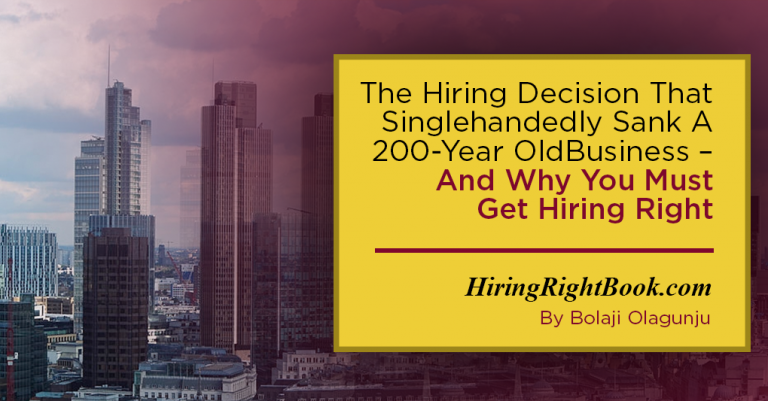Ask any recruiter or executive and there is a very good chance they have at least one horror story about a poor hire. They would probably tell you the decision felt good at the point of recruitment, but it ended up being a disastrous mistake.
And such mistakes usually lead to significant financial losses for organizations. According to Harvard Business School, the cost of a poor hire can be as high as three to five times the employee’s annual salary.
So, how much could one bad hiring decision cost your organization?
I once asked a group of eighty business executives attending a Digital Technology Conference to vote for what they believed to be the worst hiring decision of all time.
After much deliberation, they settled on Nick Leeson, the rogue trader who in 1995 caused the collapse of Barings, the United Kingdom’s oldest merchant bank.
Through a series of fraudulent, unauthorized and speculative trading activities, Leeson singlehandedly generated losses of £827 million, double the bank’s trading capital. The bank did not survive the impact and was sold to a rival for a nominal price of £1.
An establishment that had been going strong since 1762 was bankrupted overnight and thousands of its employees and shareholders lost their source of livelihood. All because on one fateful day, a hiring manager unwittingly gave Nick Leeson access into the organization he would later sink.
Undoubtedly, wrong hiring results in financial loss. But beyond that, its impact on intangible assets such as morale, reputation and creativity cannot be ignored. When an organization consistently fails in hiring the right people, every level of the organization is affected.
When recruitment is ineffective, everyone loses.
Customers are subjected to consistently poor service
The biggest loser at the end of the day is the customer. Through no fault of theirs, they are subjected to poor services, failed promises, financial losses and a variety of other unpleasant experiences.
Managers are saddled with unnecessary work
Anyone unlucky enough to manage an unproductive employee is likely to end up with a paid audience; that is, an employee who watches the manager do the work he or she is being paid to do. Many managers are stressed out and overwhelmed because of the poor quality of employees working under them. Spending most of their time reworking the sub-standard work of their direct reports leaves very little room for strategic management and other responsibilities critical to their success.
The wellbeing of a wrong hire is at risk
Not all wrong hires are as a result of bringing in the wrong people. Sometimes the right people are placed in roles they are unsuited for. And this is unfair to the employee, too. I believe that every employee wants to succeed at their job. They want to take pride in their work and be recognized for exceptional performance.
If an employee is wrongly placed, the resulting underperformance can have a devastating effect on their wellbeing. For one, if they get sacked, that is a significant loss of income. Emotionally, their self-esteem takes a hit, which can lead to depression and spread to other aspects of their lives including their health, relationships and family.
Team morale and productivity decline
There is nothing more damaging to team spirit and collegial relationships than having to deal with colleagues who are weak links. Work is tough enough without having to do other people’s work as well. Weak links have a degenerative effect on team morale and productivity.
Recruitment of top talent becomes challenging
The inefficiencies of wrong hires will eventually clog the productivity flow of any organization and create a downward trend in overall effectiveness. Such an organization becomes less attractive to people who desire to work in a progressive environment. Their best employees jump ship and talented prospects stay away in droves.
For any organization to thrive, hiring the right people for the right roles must be its biggest priority. One of the greatest businessmen that ever lived, Andrew Carnegie, gave some insight into the secret of his success through this message etched onto his tombstone: “Here lies a man who knew how to enlist in his service better men than himself.”
Even in death, the man who built the world’s first billion-dollar corporation wanted the world to know that the most important value a business executive can bring into an organization is to hire the right people. You cannot afford to get hiring wrong.
To access best-in-class hiring insights, strategies and practices gleaned from a twenty-year experience of recruitment and business consulting with leading organizations, get a copy of the groundbreaking recruitment manual, Hiring Right, at www.hiringrightbook.com.
